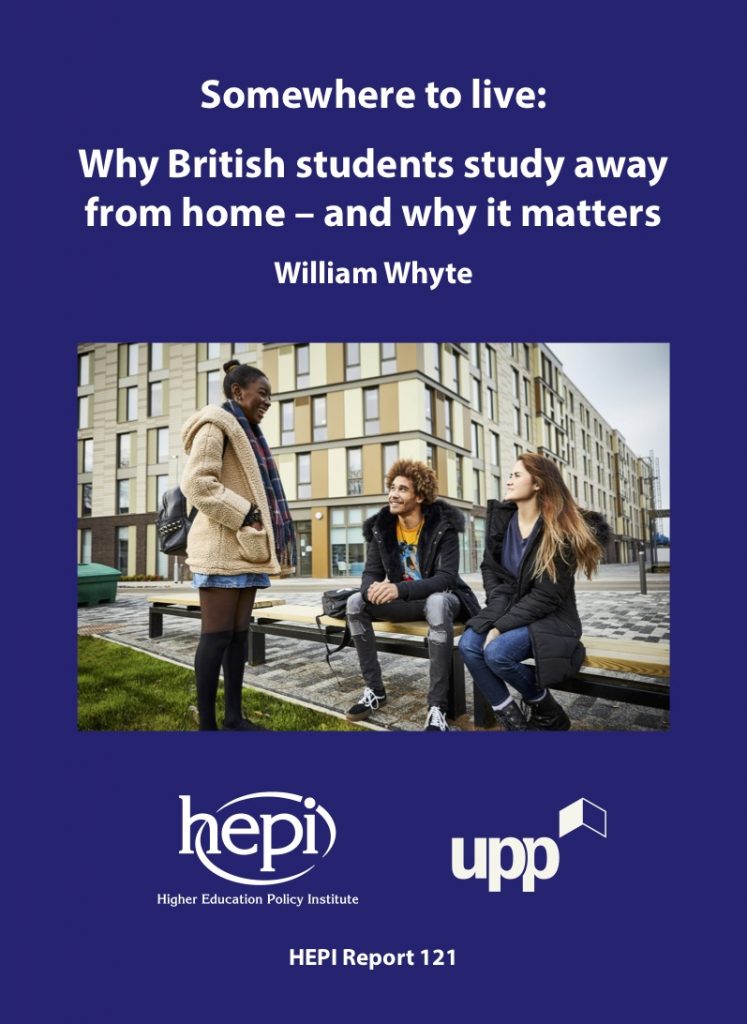Why do so many UK students live away from home and why does it matter?


A new report from the Higher Education Policy Institute and the University Partnerships Programme (UPP), Somewhere to live: Why British students study away from home – and why it matters by Professor William Whyte, looks at why so many students choose to live away from home.
The paper considers the Medieval origins of the residential university, its spread after the Second World War and the policy consequences for taxpayers, students and institutions. It also raises questions for the future.
The report was made possible through sponsorship from UPP, the UK’s leading provider of on-campus residential and academic accommodation infrastructure (though editorial control was retained by the author and HEPI). The launch of the report follows HEPI / UPP roundtable events on residential student living at both the Labour and Conservative Party Conferences.
The Reverend Professor William Whyte, the author of the report, said:
There is general agreement within the higher education sector that there are areas of student accommodation provision that need reforming. But there is much less discussion about why we expect students to need specific accommodation at all. In this report, I explore a distinctive but neglected aspect of UK higher education: the fact that British students are more likely to study away from home than almost any others anywhere in the world.
Uncovering this history enables us to understand how the residential model became such a defining feature of Britain’s universities. More importantly, it raises questions about the nature and purposes of that model today.
There are many problems with the residential university. It is expensive – and becoming ever more so. It disadvantages those students who do not live away from home and those young people who never get a chance to attend university. It can alienate and exclude others, especially the communities who live around the campus. And yet, residence is undeniably popular and remains desirable, despite its costs. By tracing its history, we can also consider its future, and how it might come to serve the interests of all.
In the Foreword to the report, Jon Wakeford, UPP’s Group Corporate Affairs Director and Chair of the UPP Foundation, writes:
This report makes an important contribution to current debates on higher education by exploring why Britain has adopted residential campus living for many students, what the impact of this has been and how this might develop in the future.
Demand for student accommodation remains strong, with many young people still wishing to leave home to benefit from a fully immersive higher education experience.
Importantly, Professor Whyte outlines how the issue of the value-for-money of accommodation has emerged as a key area of focus for both the NUS [National Union of Students] and the Office for Students in the wider context of the affordability of going to university. We would support such a review and engage alongside our university partners with whom we agree rents annually.
Nick Hillman, the Director of HEPI, said:
There are big consequences from having such a high proportion of students living away from home. Some of them are positive, as it makes higher education even more life transforming and a clearer part of the journey to independent adulthood. But there are challenges too, such as the extra support needed to cover students’ cost of living and the bigger break between school or college and higher education.
The whole issue is even reflected in the current general election campaign, which has brought to life the long-standing issue of where students should be allowed to vote. They typically have one foot in one constituency and the other in another, straddling two different areas. They may be on the electoral register in both places, though often move to a third area as soon as they graduate.
This report provides the opportunity to discuss what student accommodation should be like in the future. What proportion of students should live away from home? How costly should it be to live in bespoke student accommodation? What support should be on offer? All these questions and more need to be discussed in detail if today’s student body, which is more diverse than ever before, are to be looked after properly.
The author of the report, William Whyte, is Professor of Social and Architectural History and a fellow of St John’s College, Oxford. He was a Commissioner on the recent Commission on the Civic University and currently serves as the Assessor of the University of Oxford. His books include Redbrick: a social and architectural history of Britain’s civic universities.
The Higher Education Policy Institute was established in 2002 to shape the higher education policy debate through evidence. It is the United Kingdom’s only independent think tank devoted to higher education. HEPI is a non-partisan charity funded in part by organisations and universities that wish to see a vibrant higher education debate.
This project was sponsored by the University Partnerships Programme (UPP), but editorial control was retained by the author and HEPI’s staff, Advisory Board and Trustees. UPP is the UK’s leading provider of on-campus residential and academic accommodation infrastructure. UPP has over 35,000 rooms in operation or under construction through long-term bespoke partnerships with 15 world-leading higher education institutions.











Responses